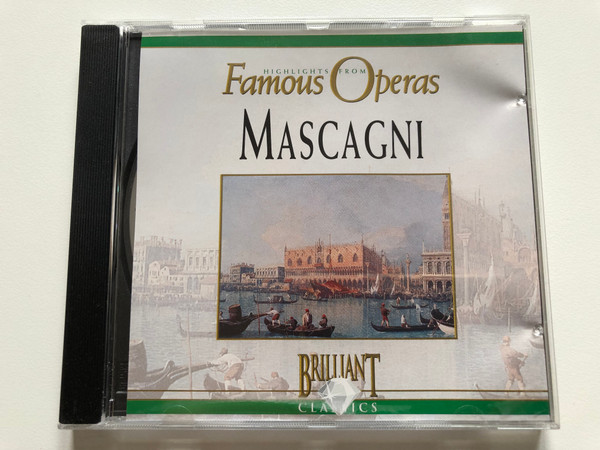Description
Highlights From Famous Operas - CD 7 - Mascagni, Puccini, Verdi / Brilliant Classics Audio CD 1994 / 280741
UPC 5028421807416
Pietro Mascagni (7 December 1863 – 2 August 1945) was an Italian composer primarily known for his operas. His 1890 masterpiece Cavalleria rusticana caused one of the greatest sensations in opera history and single-handedly ushered in the Verismo movement in Italian dramatic music. While it was often held that Mascagni, like Ruggiero Leoncavallo, was a "one-opera man" who could never repeat his first success, L'amico Fritz and Iris have remained in the repertoire in Europe (especially Italy) since their premieres.
Mascagni wrote fifteen operas, an operetta, several orchestral and vocal works, and also songs and piano music. He enjoyed immense success during his lifetime, both as a composer and conductor of his own and other people's music and created a variety of styles in his operas.
Giacomo Puccini (22 December 1858 – 29 November 1924) was an Italian composer known primarily for his operas. Regarded as the greatest and most successful proponent of Italian opera after Verdi, he was descended from a long line of composers, stemming to the late-Baroque era. Though his early work was firmly rooted in traditional late-19th-century Romantic Italian opera he later developed his work in the realistic verismo style, of which he became one of the leading exponents.
His most renowned works are La bohème (1896), Tosca (1900), Madama Butterfly (1904), and Turandot (1924), all of which are among the most frequently performed and recorded of all operas.
Giuseppe Fortunino Francesco Verdi (Italian: [dʒuˈzɛppe ˈverdi]; 9 or 10 October 1813 – 27 January 1901) was an Italian opera composer. He was born near Busseto to a provincial family of moderate means, receiving a musical education with the help of a local patron. Verdi came to dominate the Italian opera scene after the era of Gioachino Rossini, Gaetano Donizetti, and Vincenzo Bellini, whose works significantly influenced him.
In his early operas, Verdi demonstrated a sympathy with the Risorgimento movement which sought the unification of Italy. He also participated briefly as an elected politician. The chorus "Va, pensiero" from his early opera Nabucco (1842), and similar choruses in later operas, were much in the spirit of the unification movement, and the composer himself became esteemed as a representative of these ideals. An intensely private person, Verdi did not seek to ingratiate himself with popular movements. As he became professionally successful he was able to reduce his operatic workload and sought to establish himself as a landowner in his native region. He surprised the musical world by returning, after his success with the opera Aida (1871), with three late masterpieces: his Requiem (1874), and the operas Otello (1887) and Falstaff (1893).
His operas remain extremely popular, especially the three peaks of his 'middle period': Rigoletto, Il trovatore and La traviata. The bicentenary of his birth in 2013 was widely celebrated in broadcasts and performances.
Tracklist:
1. Pietro Mascagni: Cavalleria Rusticana - Tu Qui, Santuzza 12:23
2. Giacomo Puccini - Manon Lescaut - Oh, Saro La Piu Bella, Act II 8:46
3. Giacomo Puccini - Tosca - Mario! Mario! Mario! Son Qui, Act I 12:40
4. Giuseppe Verdi - Otello - Gia Nella Notte Densa, Act I 10:51
5. Giuseppe Verdi - Un Ballo In Maschera - Teco Io Sto, Gran Diol, Act II 9:17
6. Giuseppe Verdi - Aida - La fatal Pieta Sovra Me Si Chuse, Act IV 11:14






















